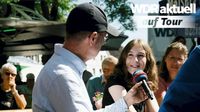On Saturday, May 10, 2025, the WDR aktuell team visited Beverungen as part of their ongoing tour, aiming to connect with local residents and understand their concerns and aspirations. Nestled in the district of Höxter, Beverungen is home to approximately 13,000 people and is characterized by its scenic beauty, cultural offerings, and a strong sense of community. However, despite its picturesque surroundings along the Weser River, the town faces significant challenges, particularly regarding public transportation, youth engagement, and economic prospects.
The WDR aktuell tour has been a platform for residents to voice their opinions on various local issues, and Beverungen was no exception. During the visit, the team gathered insights from local inhabitants through informal street interviews and an online survey that invited all residents to participate. The feedback highlighted a deep appreciation for Beverungen's cultural events, natural beauty, and shopping options, but also underscored several areas needing improvement.
Among the locals interviewed, 22-year-old Lara Schroeder, who is training to become a caregiver, expressed pride in the cultural activities available in the town. "We have a lot of events in the town hall, from comedians to musicians. There’s something for both younger and older generations. However, I feel the younger generation doesn’t have enough of a voice in politics. We should have more say in what can be improved in our community," she stated.
Similarly, 21-year-old Chantal Adler, a childcare worker, echoed these sentiments, noting that while Beverungen hosts attractive events like the Blütenfest, there’s a lack of opportunities tailored for young people. "I feel somewhat left out when it comes to options for us. There aren’t enough activities specifically for the youth," she mentioned.
Amir Sheikhmous, a 33-year-old cook who has lived in Germany for a decade, shared his positive experiences of living in Beverungen. "It’s a beautiful village with the Weser River and plenty of housing options. However, finding accommodation can be tough, especially with the influx of people from Ukraine seeking refuge due to the war," he said.
On the other hand, 23-year-old Saskia Dewenter lamented the loss of significant events that once took place in Beverungen. "Many events that used to happen here have moved to Höxter, which is disappointing. We had the 'Heaven Can Wait' festival here, and now it’s gone. It was nice to have those events centrally located in our town," she reflected.
Ralf Wortmann, a 63-year-old retiree, offered a broader perspective on the town’s cultural landscape. He highlighted Beverungen's strong offerings in arts and community events, mentioning the Weser Festival and various open-air concerts as significant cultural highlights. "Beverungen is a very livable town. We have great cultural events and good access to schools and recreational facilities. However, the youth offerings could be improved. I remember when we had dedicated youth centers, and now they are lacking. Young people often gather at the Weser meadows instead," he noted.
The WDR aktuell team's visit also coincided with the release of a national survey conducted by Infratest dimap, commissioned by WDR, which examined how rural residents perceive political representation. The results revealed a stark contrast between urban and rural sentiments regarding political engagement. Only 27% of rural respondents felt that their interests were adequately represented, compared to 63% of urban dwellers who felt positively about their political representation.
This disparity raises questions about the effectiveness of political engagement in rural areas like Beverungen. The survey results showed that 61% of rural respondents rated their representation negatively, with many feeling disconnected from the political process. In contrast, urban residents expressed a much more favorable view of their political representation, indicating a significant gap in how different communities are engaged by policymakers.
The findings reflect a broader concern among Beverungen residents regarding the perceived neglect of rural areas by national politics. Many locals voiced their belief that their needs and interests are often overlooked in favor of urban priorities. This sentiment was echoed throughout the day as the WDR team engaged with residents, who shared their hopes for better representation and more attention to local issues.
As the WDR aktuell team wrapped up their visit, it was clear that while Beverungen boasts a vibrant community rich in culture and natural beauty, it also grapples with challenges that require attention from both local and national leaders. The feedback collected throughout the day serves as a reminder of the importance of listening to voices from all corners of society, especially those in rural areas who often feel sidelined in political discourse.
Overall, the WDR aktuell tour not only highlighted the strengths of Beverungen but also illuminated the pressing issues that residents hope will be addressed. As the team continues its journey through various towns and cities, the stories and insights from Beverungen will undoubtedly contribute to a larger conversation about the future of rural communities in Germany.




